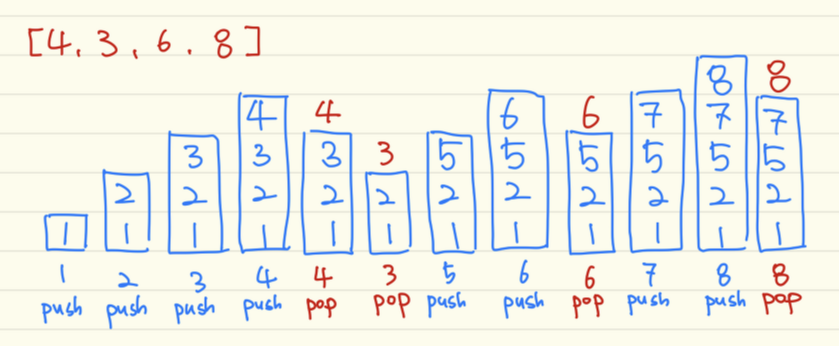파이썬 백준 1874번
실버2
https://www.acmicpc.net/problem/1874
1874번: 스택 수열
1부터 n까지에 수에 대해 차례로 [push, push, push, push, pop, pop, push, push, pop, push, push, pop, pop, pop, pop, pop] 연산을 수행하면 수열 [4, 3, 6, 8, 7, 5, 2, 1]을 얻을 수 있다.
www.acmicpc.net
문제 보기

분류: 자료 구조, 스택
문제 풀기
문제를 풀기에 앞서 무슨 소리를 하는지 이해하는데 시간이 걸렸다. 결국은 검색을 통해 문제가 이야기하고자 하는 것의 방향성을 잡을 수 있었는데 그분들도 문제를 이해하는데 어려움이 있었다고 한다;;;
여하튼 문제에서 말하고자 하는 것은

stack 이 1, 2, 3 ... 순차적으로 쌓여갈 때 주어진 행렬의 index 0 의 value 와 같은 값이 있으면 pop 을 하고, 다음 index 의 value 와 같은 값이 있으면 pop 또는 push 를 계속적으로 해나가면서 주어진 행렬을 만들어 가는 것이다.

push 나 pop 을 하여도 주어진 행렬을 만들 수 없는 경우라면 "NO" 를 프린트한다.
코드의 진행은 숫자의 개수 n 을 입력받고 주어진 수들로 배열 저장한 후 fnCreatingSequenceWithAscendingStack(given_sequence) 함수에 넣어 push, pop, NO 를 찾는다.
주어진 수열의 list 를 원소 하나하나 빼내어 1, 2, 3, ... 으로 증가하는 stack_count 또는 stacking_box[-1] 와 비교하여 push, pop 에 해당하는 "+", "-" 를 순차적으로 저장한다.
stacking_box = []
pushpop = []
stack_count = 1
for seq in given_sequence:
while stack_count <= seq:
stacking_box.append(stack_count)
pushpop.append("+")
stack_count += 1
if seq == stacking_box[-1]:
stacking_box.pop()
pushpop.append("-")
모든 for seq in given_sequence: 에 대해 결과가 반영되면 return pushpop 을 한다.
만약 반복문을 도는 중에 수열 list 의 원소가 while 과 if 문을 모두 지나치면 return "N" 을 해준다.
return 된 결과 result 를 프린트해준다.
for r in result:
if r == "N":
print("NO")
else:
print(r)
코드 보기
import sys
inputdata = sys.stdin.readline
def fnCreatingSequenceWithAscendingStack(given_sequence):
stacking_box = []
pushpop = []
stack_count = 1
for seq in given_sequence:
# print(f'seq: {seq}') # test print
while stack_count <= seq:
# print(f'stack_count: {stack_count}') # test print
stacking_box.append(stack_count)
# print(f'pushed_stacking_box: {stacking_box}') # test print
pushpop.append("+")
stack_count += 1
if seq == stacking_box[-1]:
stacking_box.pop()
# print(f'popped_stacking_box: {stacking_box}') # test print
pushpop.append("-")
else:
return "N"
# print(f'pushpop: {pushpop}') # test print
return pushpop
if __name__ == "__main__":
n = int(inputdata().strip())
given_sequence = []
for _ in range(n):
given_sequence.append(int(inputdata().strip()))
# print(given_sequence) # test print
result = fnCreatingSequenceWithAscendingStack(given_sequence)
for r in result:
if r == "N":
print("NO")
else:
print(r)
추가 하기
import sys
inputdata = sys.stdin.readline
def fnCreatingSequenceWithAscendingStack(given_sequence):
stacking_box = []
pushpop = []
stack_count = 1
for seq in given_sequence:
print(f'seq: {seq}') # test print
while stack_count <= seq:
print(f'stack_count: {stack_count}') # test print
stacking_box.append(stack_count)
print(f'pushed_stacking_box: {stacking_box}') # test print
pushpop.append("+")
stack_count += 1
if seq == stacking_box[-1]:
stacking_box.pop()
print(f'popped_stacking_box: {stacking_box}') # test print
pushpop.append("-")
else:
return "N"
print(f'pushpop: {pushpop}') # test print
return pushpop
if __name__ == "__main__":
n = int(inputdata().strip())
given_sequence = []
for _ in range(n):
given_sequence.append(int(inputdata().strip()))
print(given_sequence) # test print
result = fnCreatingSequenceWithAscendingStack(given_sequence)
for r in result:
if r == "N":
print("NO")
else:
print(r)
# 8
# 4
# 3
# 6
# 8
# 7
# 5
# 2
# 1
# [4, 3, 6, 8, 7, 5, 2, 1]
# seq: 4
# stack_count: 1
# pushed_stacking_box: [1]
# stack_count: 2
# pushed_stacking_box: [1, 2]
# stack_count: 3
# pushed_stacking_box: [1, 2, 3]
# stack_count: 4
# pushed_stacking_box: [1, 2, 3, 4]
# popped_stacking_box: [1, 2, 3]
# seq: 3
# popped_stacking_box: [1, 2]
# seq: 6
# stack_count: 5
# pushed_stacking_box: [1, 2, 5]
# stack_count: 6
# pushed_stacking_box: [1, 2, 5, 6]
# popped_stacking_box: [1, 2, 5]
# seq: 8
# stack_count: 7
# pushed_stacking_box: [1, 2, 5, 7]
# stack_count: 8
# pushed_stacking_box: [1, 2, 5, 7, 8]
# popped_stacking_box: [1, 2, 5, 7]
# seq: 7
# popped_stacking_box: [1, 2, 5]
# seq: 5
# popped_stacking_box: [1, 2]
# seq: 2
# popped_stacking_box: [1]
# seq: 1
# popped_stacking_box: []
# pushpop: ['+', '+', '+', '+', '-', '-', '+', '+', '-', '+', '+', '-', '-', '-', '-', '-']
# +
# +
# +
# +
# -
# -
# +
# +
# -
# +
# +
# -
# -
# -
# -
# -
'공부하기 > 백준' 카테고리의 다른 글
| [Python] 백준 풀기 9095 - 1, 2, 3 더하기 (0) | 2022.11.07 |
|---|---|
| [JavaScript] 백준 풀기 2438 - 별 찍기 - 1 (1) | 2022.11.06 |
| [Python] 백준 풀기 2587 - 대표값2 (1) | 2022.11.04 |
| [JavaScript] 백준 풀기 2577 - 숫자의 개수 (0) | 2022.11.03 |
| [JavaScript] 백준 풀기 2588 - 곱셈 (2) | 2022.11.02 |